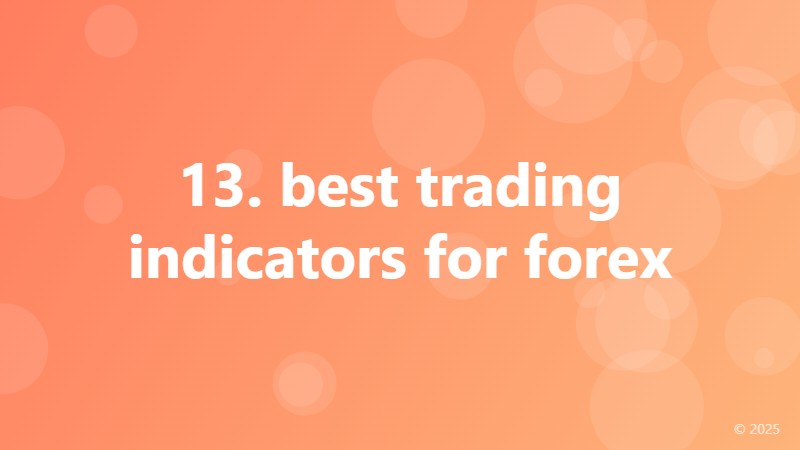13. best trading indicators for forex

Unlocking the Secrets of Forex Trading: 13 Best Trading Indicators
When it comes to Forex trading, having the right tools and indicators can make all the difference between success and failure. With so many options available, it can be overwhelming to determine which indicators are the most effective. In this article, we'll explore the 13 best trading indicators for Forex, providing you with a comprehensive guide to help you make informed trading decisions.
1. Moving Averages
Moving Averages (MA) are a popular and widely used indicator in Forex trading. By smoothing out price fluctuations, MAs help traders identify trends and make predictions about future price movements. There are three types of MAs: Simple Moving Average (SMA), Exponential Moving Average (EMA), and Weighted Moving Average (WMA).
2. Relative Strength Index (RSI)
The Relative Strength Index (RSI) is a momentum indicator that measures the speed and change of price movements. It helps traders identify overbought and oversold conditions, allowing them to make more informed buy and sell decisions.
3. Bollinger Bands
Bollinger Bands are a volatility indicator that consists of three lines: a moving average, an upper band, and a lower band. They help traders identify breakouts, trends, and potential reversals, making them a valuable tool in Forex trading.
4. Stochastic Oscillator
The Stochastic Oscillator is a momentum indicator that compares the closing price of a currency pair to its price range over a given period. It helps traders identify overbought and oversold conditions, as well as potential trend reversals.
5. MACD (Moving Average Convergence Divergence)
The MACD is a trend-following indicator that uses two moving averages to identify changes in the strength, momentum, and duration of a trend. It's a powerful tool for identifying buy and sell signals.
6. Ichimoku Cloud
Ichimoku Cloud is a comprehensive indicator that provides a detailed view of the market. It consists of five components: Tenkan-sen, Kijun-sen, Senkou Span A, Senkou Span B, and Chikou Span. It helps traders identify trends, support and resistance levels, and potential reversals.
7. Force Index
The Force Index is a momentum indicator that measures the amount of energy or "force" behind a price move. It helps traders identify trends, potential reversals, and areas of support and resistance.
8. Commodity Channel Index (CCI)
The Commodity Channel Index (CCI) is a momentum indicator that measures the difference between a currency pair's price and its average price over a given period. It helps traders identify overbought and oversold conditions, as well as potential trend reversals.
9. Average True Range (ATR)
The Average True Range (ATR) is a volatility indicator that measures the average distance between a currency pair's high and low prices over a given period. It helps traders identify potential breakouts and trend reversals.
10. Parabolic SAR
The Parabolic SAR is a trend-following indicator that uses a series of dots to indicate potential trend reversals. It's a valuable tool for identifying buy and sell signals, as well as areas of support and resistance.
11. On Balance Volume (OBV)
The On Balance Volume (OBV) is a momentum indicator that measures the flow of money into and out of a currency pair. It helps traders identify trends, potential reversals, and areas of support and resistance.
12. Accumulation/Distribution Line
The Accumulation/Distribution Line is a momentum indicator that measures the amount of buying and selling pressure in a currency pair. It helps traders identify trends, potential reversals, and areas of support and resistance.
13. Donchian Channels
Donchian Channels are a volatility indicator that consists of three lines: a middle line, an upper line, and a lower line. They help traders identify breakouts, trends, and potential reversals, making them a valuable tool in Forex trading.
In conclusion, these 13 best trading indicators for Forex provide a comprehensive toolkit for traders to make informed decisions and maximize their profits. By combining multiple indicators and using them in conjunction with sound risk management strategies, traders can increase their chances of success in the Forex market.